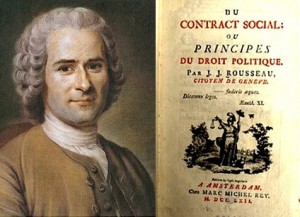Rousseau and the Noble Savage
Contrary to Thomas Hobbes, Jean-Jacques Rousseau, a French philosopher of the 18th century, argued that people were inherently peaceful. To Rousseau, individuals in a state of nature embodied peacefulness and equality. In addition to being socially egalitarian, people in a state of nature also lived in harmony with nature. The following pages discuss this concept of the ‘Noble Savage’ in further detail.
Redford, Kent H. 1991. “The Ecologically Noble Savage” Cultural Survival Quarterly 15(1): 46.
Although the noble savage may appear an optimistic vision of human nature, it is little more than a myth, often inhibiting peoples’ honest understandings of indigenous groups. In fact, the noble savage stereotype has historically been applied to indigenous groups with negative results. It was a Western conception that enabled Westerners to further separate themselves from indigenous peoples. Indigenous groups were natural, while Westerners were cultural. The following article discusses the unethical results of the application of the noble savage stereotype by Anglo-Americans to Native Americans.
Although a myth, the noble savage is still a popular concept in western thought. More recently, it has been loosely adopted by certain environmentalists who want to display indigenous groups as being environmentally pure and wise. Here (see #14) is an abstract of an article written by J. Peter Brosius that details this new application of the noble savage myth.
